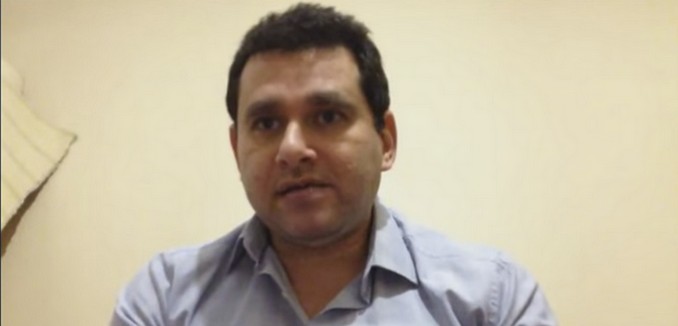Syrian refugee Aboud Dandachi wrote an essay Monday in Tablet in which he expressed gratitude to his “true friends,” including Jewish and Israeli people and organization who have assisted him and other refugees.
Dandachi, a former high-tech worker who created a website called Thank You Am Israel, wrote appreciatively that it “is astonishing, absolutely astonishing, that there have been so many instances of Jewish and Israeli organizations and individuals who have gone out of their way to assist and help Syrians in need.”
A native of Homs, which he described as being “the most livable city in all of the Levant,” Dandachi just wanted to ignore the protests and establish himself professionally when they first started in 2011. That changed on April 17, when protests at a funeral broke out. Tens of thousands staged a sit-in, in what Dandachi describes as “Syria’s Tahrir Square moment.” The security apparatus of Iran-backed dictator Bashar al-Assad attacked the crowd, killing dozens.
That event turned Dandachi into an activist. He started to speak to the BBC to tell the world what was going on. Homs being a hotbed of dissent, and the regime began bombing the city. In February 2012, Dandachi was forced to flee his home and ended up in the port city of Tartous, one of the Assad regime’s strongholds, because it was “the one place where I thought the war wouldn’t reach.”
Dandachi stayed in Tartous for about a year and a half until after Assad killed 1,400 people in a chemical attack in a Damascus suburb. It was then that he decided to flee his native country via Lebanon to Turkey, where he currently resides.
As the civil war continued, Dandachi became more and more isolated, not only from friends who wanted to put their pasts in Syria behind them, but also from much of the world, which failed to stand up to Assad and would not accept refugees.
Despite the challenges, Dandachi wrote, “Now, Syrians as a people are starting to learn who their true friends are.”
No one could have faulted the Jewish people if they had taken a strictly hands off attitude to the humanitarian catastrophe in Syria. And yet from the earliest days of the conflict, Israeli medical teams have been offering lifesaving medical assistance to wounded Syrians. Israelis have gone into Jordan to provide aid to Syrian refugees. Tireless IsraAID volunteers are on the ground in the Balkans, ready to receive and assist the massive numbers of refugees fleeing the wars in the Middle East. And despite some understandable ambivalence on the part of many in the Jewish diaspora, many Canadian Jewish congregations have gone through an enormous amount of effort to sponsor Syrian refugees for resettlement.
He also credited “numerous American and British Jewish organizations” for advocating politically on behalf of the refugees. This support came after Dandachi saw those he thought he could rely on deny him and his fellow Syrians relief, or, in some cases, back the regime against civilians.
One true friend is worth a thousand relatives. As a Syrian, these past years have taken an enormous personal toll on me. I no longer recognize the person I was back in those optimistic days in early 2011. I no longer expect support or assistance from our “relatives,” those Arab countries who were the first to close their doors to Syrians. I and millions like me were driven from our homes by fellow Syrians and Arabs fighting under the banners of Hezbollah and Iran.
Dandachi contrasted the the “world-class” medical treatment Syrian refugees have received in Israel with “countries in the Gulf [that] make excuse after excuse as to why they can’t take in even a few thousand Syrians.”
Wars and their consequences tend to bring out the worst in individuals and societies, but the Syrian conflict has also been an occasion where extraordinary people have demonstrated acts of astonishing kindness and compassion to refugees who have nothing to give back in return save their gratitude.
In the end, Dandachi acknowledged that Syrian refugees can never repay the kindness they have received, “but at least we can say ‘thank you.’”
[Photo: TheLipTV / YouTube ]




